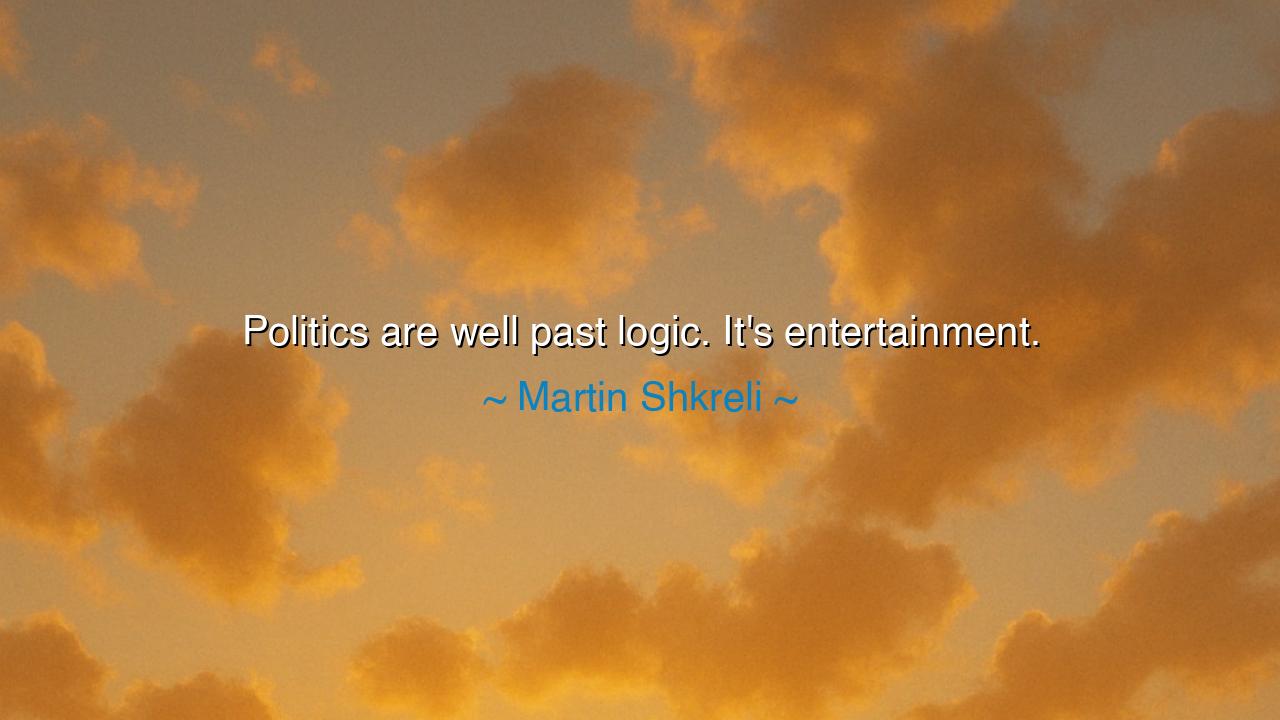
Politics are well past logic. It's entertainment.






The words of Martin Shkreli fall like a lament wrapped in irony: “Politics are well past logic. It’s entertainment.” At once dismissive and revealing, they unveil the transformation of governance from sober duty to spectacle. Once, politics was meant to be the careful weighing of laws, the pursuit of justice, the stewardship of nations. Yet in his words we hear the complaint that reason has been abandoned, and in its place stands performance—leaders not as philosophers, but as actors, seeking applause rather than truth.
This is no new phenomenon. The ancients themselves saw how easily power devolved into theater. In Rome, the forum was once the place of reasoned debate, where Cicero’s logic shaped the destiny of the Republic. But as centuries passed, the cry of the people turned to bread and circuses, and the emperors gave them both. The Senate became less a council of wisdom and more a stage for display. In this, Shkreli’s words echo the lesson of Rome: that when politics abandons logic, it seeks survival in entertainment.
Consider also the tale of Napoleon Bonaparte. Though he rose with brilliance in war, he soon mastered the theater of politics. His speeches, his parades, his image as savior of France—these were as vital as his cannons. He understood, as Shkreli suggests, that politics is not only decisions but display. The people must be moved not only by reason but by drama, and in that drama lies both strength and danger. For though theater may win hearts, it cannot always sustain justice.
Even in the modern age, we see this truth played out. Televised debates, political rallies, and campaigns are crafted less for rational discourse and more for the stirring of emotion. The leader who commands the crowd with wit, anger, or charm often triumphs over the one who quietly reasons. Thus, politics becomes a kind of entertainment, consumed by the masses as though it were sport or spectacle. Shkreli’s remark, though cynical, describes a reality that echoes across centuries.
But hidden within his words is also a warning: when politics becomes only entertainment, nations drift toward peril. The crowd that cheers today may starve tomorrow, and the laughter of the stage may give way to the silence of ruin. The ancients told us this in the fall of Athens, when demagogues charmed the people with rhetoric, only to lead them into disastrous wars. They told us again in the fall of Rome, when spectacle replaced virtue. Shkreli, knowingly or not, reminds us that we walk a path worn smooth by history.
The lesson, O seeker, is not to despair, but to awaken. If politics leans toward entertainment, then the responsibility falls upon the people to demand more. Do not be deceived by the glitter of performance or the sting of rhetoric. Look deeper, ask for logic, seek truth beneath the stage. For a nation that consumes its politics as spectacle is like a ship whose crew delights in song while ignoring the storm on the horizon.
Practical wisdom follows: train yourself to discern between reason and rhetoric. When you hear a leader speak, ask not only, “Are they entertaining?” but “Are they logical? Are they just?” Support those who offer substance, even if they lack spectacle. And in your own dealings, whether in family, community, or work, let not performance outweigh truth. Speak with clarity, act with justice, and honor logic even when others chase applause.
So let Martin Shkreli’s words be remembered: “Politics are well past logic. It’s entertainment.” They are not only an observation of the present but a reflection of history’s cycles. May we hear them as both satire and caution, and may we strive to lift politics once more from spectacle back to wisdom, from performance back to purpose. For only then can the stage of nations become not a theater of distraction, but a temple of justice.






LMLe Minh
I can see where Shkreli is coming from, but I find this perspective a little bleak. If politics has become entertainment, does that mean we’re losing sight of its true purpose—shaping society for the better? What happens when the focus is on ratings and clicks instead of tackling real issues? Is it possible to bring back logic and thoughtful discussion in a world dominated by media spectacle?
NTngoc tram
This quote seems to reflect the current state of modern politics, especially with how media coverage often focuses more on scandals and drama than policy. But doesn’t politics, at its core, need to be engaging in order to get people involved and informed? Is there a balance to strike between entertainment value and making sure the public understands the real issues at hand? Or is it too far gone now?
LLLuu Le
I’m not sure how I feel about this quote. On one hand, I agree that a lot of political discourse has become more about entertainment and less about meaningful debate. On the other, can we really reduce the complexities of politics to entertainment? Isn’t it essential for politicians to engage people emotionally to make them care about the issues? Or is it crossing a line when entertainment overtakes substance?
AHAn Ho
Shkreli's statement feels almost cynical, yet there's some truth to it, especially in the age of social media. It seems like politicians are more focused on appealing to emotions or creating sensational moments rather than presenting logical, well-thought-out policies. But is this really a new trend, or has politics always been more about spectacle than substance? Do you think this shift away from logic has hurt the effectiveness of governance?